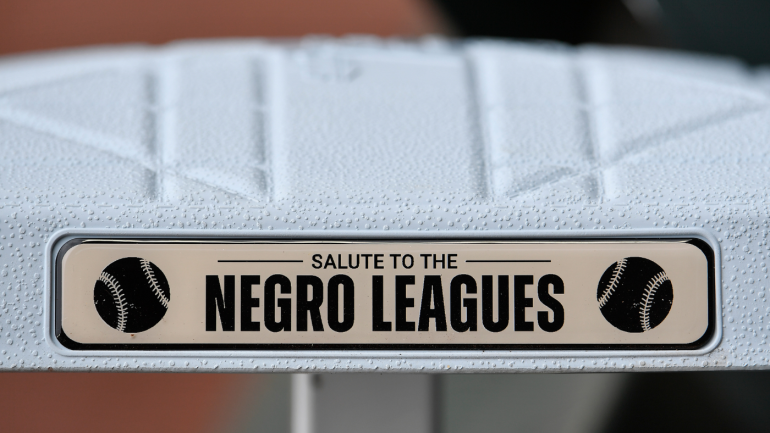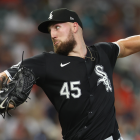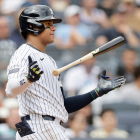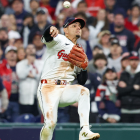
Major League Baseball has officially incorporated Negro Leagues statistics into the Major League record, the league announced Wednesday. MLB elevated the Negro Leagues to "Major League" status in 2020 and recognized the "statistics and records" of approximately 3,400 players who played in the Negro Leagues between 1920-48. Now they are part of the official record.
"We are proud that the official historical record now includes the players of the Negro Leagues," commissioner Rob Manfred said in a statement. "This initiative is focused on ensuring that future generations of fans have access to the statistics and milestones of all those who made the Negro Leagues possible. Their accomplishments on the field will be a gateway to broader learning about this triumph in American history and the path that led to Jackie Robinson's 1947 Dodger debut."
Seven leagues comprised the Negro Leagues between 1920-1948: Negro National League (I) (1920-1931), Eastern Colored League (1923-1928), American Negro League (1929), East-West League (1932), Negro Southern League (1932), Negro National League (II) (1933-1948), and the Negro American League (1937-1948). Experts estimate records from these leagues are 75% complete.
As result of Wednesday's integration, Negro Leagues legend Josh Gibson is now baseball's all-time leader in career batting average (.372, beating out Ty Cobb's .366), slugging percentage (.718, beating out Babe Ruth's .690), and OPS (1.177, beating out Ruth's 1.164). Gibson is also the new single-season leader in those categories. The new single-season leaderboards:
| Batting average | Slugging percentage | OPS |
|---|---|---|
1. Josh Gibson: .466 in 1943 | 1. Josh Gibson: .974 in 1937 | 1. Josh Gibson: 1.474 in 1931 |
2. Charlie Smith: .451 in 1929 | 2. Mule Stuttles: .898 in 1927 | 2. Josh Gibson: 1.435 in 1943 |
3. Hugh Duffy: .440 in 1898 | 3. Josh Gibson: .871 in 1943 | 3. Barry Bonds: 1.421 in 2004 |
"Shortened Negro League schedules, interspersed with revenue-raising exhibition games, were born of MLB's exclusionary practices," John Thorn, MLB's official historian, said in a statement. "To deny the best Black players of the era their rightful place among all-time leaders would be a double penalty."
Gibson played for three Negro League teams -- Memphis Red Sox, Pittsburgh Crawfords, Homestead Grays -- from 1930-46 and finished his career as a .372/.458/.718 hitter with 166 home runs in 602 games. He was a 12-time All-Star and is widely considered one of the greatest catchers in the history of the game.
"This is a historical moment for the game of baseball as these great players will forever be recognized within Major League Baseball's official record books. Congratulations to all these great players, especially Pittsburgh's own Josh Gibson," Pirates chairman Bob Nutting said in a statement. "The Pittsburgh Crawfords and Homestead Grays are an important part of the rich history of baseball in Pittsburgh. The Pirates have long celebrated these great teams and players such as Josh Gibson, Ray Brown, Oscar Charleston, Buck Leonard and so many others for their tremendous accomplishments. Whether it is in our Pirates Hall of Fame, the large baseballs on the riverwalk, the Crawfords and Grays Championship banners, the many other displays throughout PNC Park, or the support of educational displays and programs within our community, we are proud to continue to share the stories of these great players for generations to come."
In 1972, Gibson became the second Negro Leagues player inducted into the National Baseball Hall of Fame, joining Satchel Paige. Paige was inducted in 1971. Including managers and executives, there are 37 Negro Leaguers in the Hall of Fame.
"When you hear Josh Gibson's name now, it's not just that he was the greatest player in the Negro Leagues, but one of the greatest of all time. These aren't just Negro League stats. They're major-league baseball stats," Sean Gibson, Josh's great-grandson, told USA Today. "This means so much for not only the Josh Gibson family, but representing the 2,300 men in the Negro Leagues who didn't get the opportunity to play (in MLB)."
Kenesaw Mountain Landis' name was stripped from the MVP trophy in 2020 after several Hall of Famers, including Barry Larkin and Mike Schmidt, voiced their discomfort. Landis, baseball's first commissioner, played a role in keeping baseball segregated during his time as commissioner from 1920-44. Gibson's family hopes the MVP award will be renamed in his honor.
"How ironic would it be for Josh Gibson to replace the man who denied more than 2,300 men the opportunity to play baseball in the major leagues," Sean Gibson told USA Today. "I'm hoping with these stats that we can change it to the Josh Gibson MVP award. These stats make a great case for it to be named in his honor."
The Negro Leagues existed out of necessity, of course, stemming from MLB's racist and exclusionary practices that barred Black players from competing in integrated leagues for more than 50 years.
MLB celebrated the 100th anniversary of the Negro Leagues during the 2020 season, with a league-wide celebration taking place on Aug. 16.

















